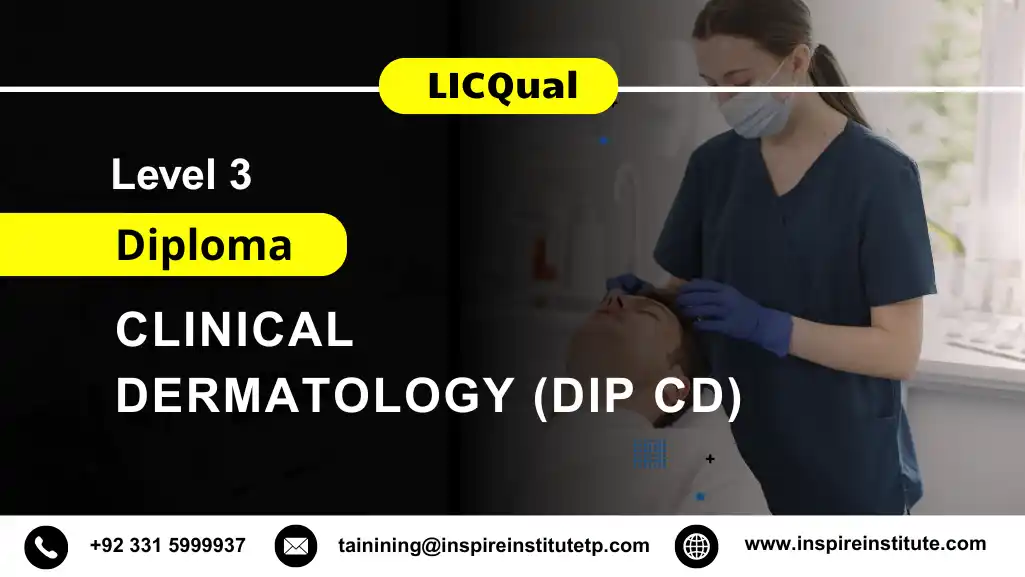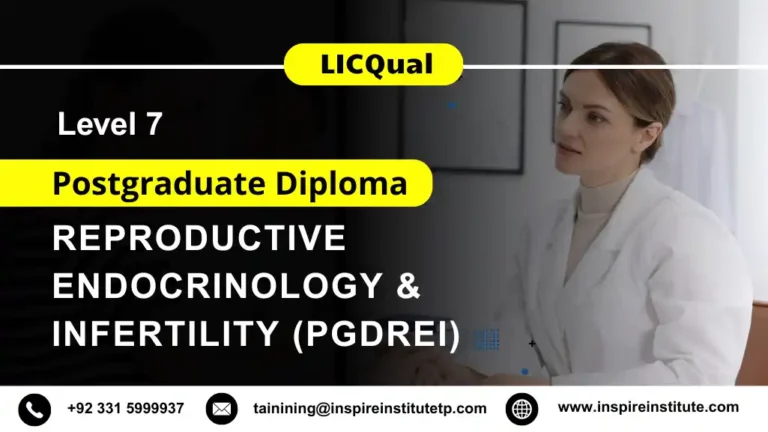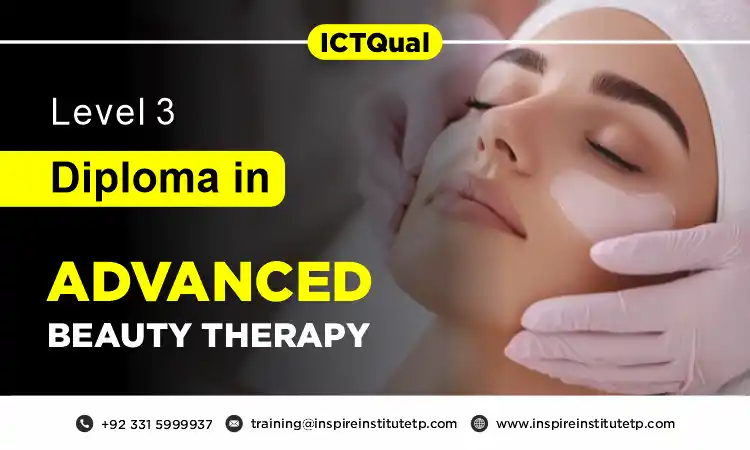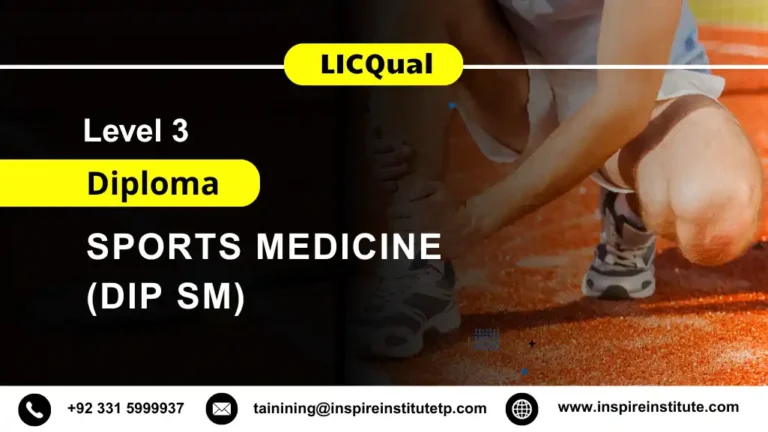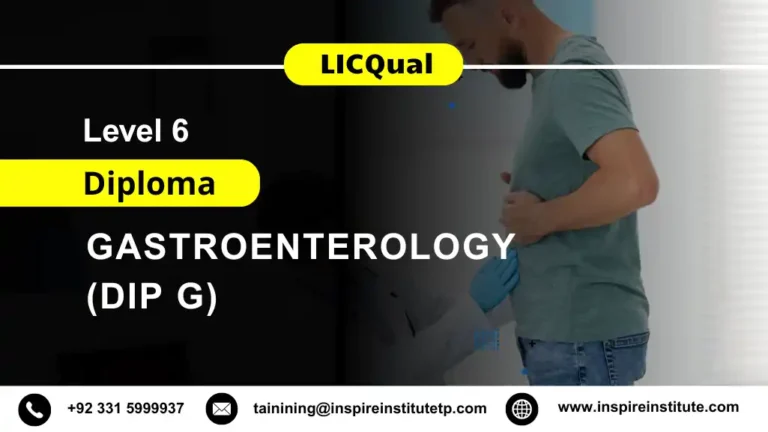LICQual Level 3 Diploma in Clinical Dermatology (Dip CD)
The LICQual Level 3 Diploma in Clinical Dermatology (Dip CD) is a UK-accredited qualification designed for healthcare professionals and aspiring practitioners who want to build a strong foundation in dermatology and skin health. Dermatology plays a vital role in modern healthcare, as skin conditions are among the most common medical issues worldwide, affecting patients of all ages. This diploma offers learners the opportunity to gain specialist knowledge in the diagnosis, management, and treatment of common dermatological disorders, preparing them to support improved patient care and outcomes.
The purpose of this course is to provide a comprehensive understanding of clinical dermatology, including skin anatomy, dermatological assessment, diagnostic techniques, and evidence-based management of conditions such as acne, eczema, psoriasis, infections, and skin cancers. Learners will also explore the impact of environmental, lifestyle, and systemic factors on skin health, ensuring a holistic approach to patient care.
Through its assignment-based structure, the LICQual Level 3 Diploma in Clinical Dermatology combines academic theory with practical application, making it ideal for individuals balancing professional duties with further study. The programme equips learners with transferable skills in clinical reasoning, patient assessment, and evidence-informed decision-making, essential for roles in healthcare, aesthetics, and medical support services.
By completing this diploma, learners gain a recognised qualification that enhances professional credibility, career development, and progression into higher-level studies. The Dip CD in Clinical Dermatology not only strengthens technical expertise but also empowers learners to contribute effectively to multidisciplinary healthcare teams, addressing the growing demand for skilled dermatology practitioners in both clinical and community settings.
Why Choose this Qualification
The LICQual Level 3 Diploma in Clinical Dermatology (Dip CD) is a UK-accredited qualification designed for healthcare professionals seeking to enhance their knowledge and practical skills in dermatology. This course combines evidence-based theoretical knowledge with practical applications to help learners understand skin anatomy, common dermatological conditions, diagnostic techniques, and patient management strategies. Participants explore a wide range of skin disorders, including acne, eczema, psoriasis, infections, and skin cancers, preparing them to deliver effective care and improve patient outcomes. Designed as an assignment-based programme, the diploma offers flexible learning, making it ideal for practitioners balancing clinical responsibilities with professional development.
Key Reasons to Choose this Qualification:
Specialist Knowledge:
Gain in-depth understanding of clinical dermatology, including skin anatomy, physiology, pathology, and the identification of common and complex skin conditions. Learners develop the ability to recognise dermatological disorders accurately and apply evidence-based approaches to patient care.
Practical Application:
Develop competence in assessing and managing skin conditions through clinical reasoning, patient evaluation, and evidence-informed treatment planning. Learners strengthen their skills in diagnosis, treatment monitoring, and preventive care, ensuring safe and effective dermatological practice.
UK-Accredited Diploma:
Earn a UK-recognised qualification that validates professional expertise in dermatology. Accreditation ensures the course aligns with clinical standards and best practices, enhancing career credibility for healthcare professionals, medical assistants, nurses, and allied health practitioners.
Flexible Learning:
Benefit from an assignment-based study structure that allows learners to progress at their own pace. This flexible model suits busy practitioners who wish to upskill in dermatology while managing clinical duties.
Evidence-Based Training:
Explore the latest research, clinical guidelines, and best practices in dermatology. The programme emphasises patient safety, accurate diagnosis, and effective treatment strategies, preparing learners to adopt modern approaches to dermatological care.
Career Development:
Expand career opportunities in healthcare, aesthetics, medical clinics, and community health services. The LICQual Level 3 Diploma in Clinical Dermatology enhances employability and provides a foundation for higher-level studies in dermatology and related fields.
The LICQual Level 3 Diploma in Clinical Dermatology (Dip CD) equips healthcare professionals with specialist knowledge, practical skills, and a UK-recognised qualification. It empowers learners to improve patient care, strengthen clinical decision-making, and advance their careers in dermatology, community healthcare, and medical support services.
Course Overview
LICQual UK Awarding Body
Average Completion Time:
4- 12 Months
Study Units: 6 Units
Evidence & Assignment Based
Mandatory Units
Who Should Take This Course
The LICQual Level 3 Diploma in Clinical Dermatology (Dip CD) is designed for healthcare professionals seeking to develop advanced knowledge and practical expertise in dermatology. This UK-accredited qualification is ideal for practitioners aiming to enhance their diagnostic skills, improve patient care, and progress within the specialised field of clinical dermatology. It equips learners with in-depth theoretical insights and practical approaches to skin assessment, common dermatological conditions, treatment strategies, and patient management, supporting both professional growth and improved quality of care in modern healthcare practice.
This course is suitable for:
General Practitioners and Doctors: Professionals seeking to expand their expertise in diagnosing and managing common and complex skin conditions, enabling them to provide effective patient care with confidence.
Nurses and Healthcare Assistants: Practitioners wishing to strengthen their skills in skin assessment, treatment planning, and patient education to optimise care outcomes and support dermatology-focused clinical services.
Aspiring Specialists: Healthcare professionals preparing for higher-level postgraduate qualifications or specialist pathways in dermatology who want to establish a strong academic and clinical foundation in the field.
Medical Aesthetics Practitioners: Professionals aiming to broaden their role by developing competencies in clinical dermatology, skincare assessment, and evidence-based treatment approaches to contribute effectively within interdisciplinary healthcare teams.
Healthcare Educators and Academics: Professionals interested in advancing their knowledge of dermatology to support teaching, research, or evidence-based training in medical and clinical education.
Healthcare-Oriented Learners: Individuals with a professional interest in skin health who wish to understand dermatological principles, patient safety, and evidence-informed approaches to improving patient outcomes.
The LICQual Level 3 Diploma in Clinical Dermatology (Dip CD) is particularly valuable for healthcare professionals seeking to specialise in dermatology, strengthen their clinical expertise, and achieve a UK-accredited qualification. By combining evidence-based learning with practical application, this diploma supports career progression, professional recognition, and the ability to meet the growing demand for skilled dermatology practitioners in modern healthcare.
Course Benefits
The LICQual Level 3 Diploma in Clinical Dermatology (Dip CD) provides significant benefits for healthcare professionals seeking to enhance their expertise in skin assessment, diagnosis, and management of dermatological conditions. By combining advanced theoretical knowledge with practical application, this diploma equips learners to identify and manage common and complex skin disorders, support effective treatment planning, and improve overall patient care. Designed as a flexible, assignment-based programme, it fosters professional development while maintaining clinical and academic excellence in modern dermatology practice.
Key Benefits of the Course:
- Specialist Knowledge: Gain a comprehensive understanding of dermatological principles, skin anatomy, pathology, and diagnostic techniques. Learn to recognise and manage conditions such as eczema, psoriasis, acne, skin infections, and precancerous lesions, enhancing evidence-based clinical decision-making.
- Practical Application: Develop competence in clinical dermatology through patient assessment, treatment planning, and safe application of topical, systemic, and procedural interventions. Learners also strengthen skills in patient education, referral pathways, and documentation to support precise and effective care delivery.
- Recognised Qualification: Earn a UK-accredited diploma that validates advanced expertise in clinical dermatology and opens professional opportunities in hospitals, primary care settings, dermatology clinics, and academic roles. Accreditation ensures alignment with current clinical standards and best practices.
- Flexible Learning Pathway: Benefit from an assignment-based study structure that allows learners to advance academically while managing clinical responsibilities. This flexible format is ideal for practising healthcare professionals balancing patient care with further education.
- Evidence-Based Training: Explore the latest research, clinical guidelines, and protocols in dermatology, ensuring safe, effective, and evidence-informed patient care. Learners are trained to integrate scientific evidence into everyday clinical practice.
- Career Development: Expand career pathways as a clinician with advanced dermatology expertise, pursue specialist roles, or take on leadership positions in healthcare delivery and education. This qualification strengthens employability and professional credibility.
- Enhanced Patient Care: Contribute to improved patient outcomes through accurate diagnosis, timely intervention, and effective treatment plans. The ability to manage skin conditions confidently supports better quality of care and long-term skin health.
- Professional Growth: Strengthen clinical reasoning, technical proficiency, and interdisciplinary collaboration within healthcare teams. This diploma prepares professionals to play a key role in dermatology, improving patient safety and outcomes.
The LICQual Level 3 Diploma in Clinical Dermatology (Dip CD) equips healthcare professionals with advanced knowledge, practical skills, and a UK-recognised qualification. It empowers learners to expand their clinical capabilities, improve patient outcomes, and pursue career progression while meeting the growing demand for skilled dermatology practitioners in modern healthcare.
Eligibility Criteria
The LICQual Level 3 Diploma in Clinical Dermatology (Dip CD) is a UK-accredited programme designed for healthcare professionals who wish to develop specialist knowledge and practical skills in dermatology. This assignment-based qualification combines theoretical understanding with applied clinical practice, making it ideal for nurses, general practitioners, healthcare assistants, and medical academics seeking to enhance their expertise in the diagnosis, treatment, and management of skin conditions. By meeting the entry requirements, learners are fully prepared to succeed in the programme and apply their dermatology knowledge confidently in professional practice.
Educational Background:
Applicants must hold a recognised healthcare qualification such as a nursing degree, medical degree (MBBS, MD), or an equivalent professional credential. Those with a Level 2 or Level 3 diploma in healthcare or related clinical fields may also be considered. Equivalent international qualifications will be reviewed on a case-by-case basis to ensure suitability for the programme.
Professional Experience:
A minimum of one year of clinical experience in healthcare, primary care, or dermatology-related practice is recommended. Prior exposure to patient assessment, skin care, or clinical procedures is advantageous, though motivated healthcare professionals without direct dermatology experience may also apply.
Age Requirement:
Learners must be at least 18 years of age at the time of enrolment, ensuring they possess the professional maturity, responsibility, and clinical judgment required for specialised training.
Language Proficiency:
Since the programme is delivered in English, learners should demonstrate proficiency in reading, writing, and professional communication. A minimum IELTS score of 6.0 or an equivalent qualification is recommended for non-native English speakers to ensure full engagement with course materials and successful completion of assignments.
Technical Requirements:
Applicants should have access to a computer or laptop with a reliable internet connection. Basic IT skills are required to access digital learning resources, conduct research, and submit assignments via online platforms.
Required Documents:
Applicants must submit a valid ID or passport, proof of educational qualifications, and evidence of professional experience (if applicable). Additional documentation may be requested from learners presenting international qualifications to confirm eligibility.
The Qualification Process
LICQual Level 3 Diploma in Clinical Dermatology (Dip CD) follows a structured pathway to ensure learners gain comprehensive knowledge, practical skills, and professional competence in community oral healthcare.
Step 1: Self-Assessment
Learners review the entry requirements to confirm eligibility. Candidates with a background in dentistry, oral health, or public health are encouraged to apply.
Step 2: Registration
Complete the registration process by submitting required documents such as proof of qualifications, a valid ID, and payment of enrollment fees.
Step 3: Induction
An induction session is conducted to:
- Verify learner eligibility and documentation.
- Introduce study materials, learning outcomes, and assessment procedures.
Step 4: Learning and Evidence Submission
Learners complete assignments, case studies, and practical exercises demonstrating competence in public health dentistry, community oral health assessment, preventive strategies, and program planning.
Step 5: Feedback and Revision
Assessors review submitted evidence and provide constructive feedback. Learners can revise and resubmit work to meet all required standards.
Step 6: Competence Validation
Final submissions are evaluated to confirm that learners have met all theoretical and practical learning outcomes.
Step 7: Internal Quality Assurance (IQA)
The IQA team reviews the assessment process to ensure accuracy, fairness, and compliance with international standards.
Step 8: External Verification (EQA)
External verifiers validate the authenticity and quality of learner achievements.
Step 9: Certification
Upon successful verification, learners are awarded LICQual Level 3 Diploma in Clinical Dermatology (Dip CD) , demonstrating advanced proficiency in community oral healthcare and preparing them for professional growth in dental public health, preventive dentistry, and healthcare policy.

